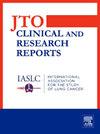Multisite Randomized Controlled Trial of CareSTEPS: A Supportive Care Intervention for the Family Caregivers of Patients With Advanced Lung Cancer
IF 3
Q2 ONCOLOGY
引用次数: 0
Abstract
Objectives
Patients with advanced lung cancer (LC) face significant physical, psychological, and functional challenges, increasing their reliance on caregivers for practical and emotional support. This study evaluates the efficacy of CareSTEPS (Self-Care, Stress management, Symptom management, Effective communication, Problem-solving, and Social support), a 6-week telephone-delivered intervention designed to improve psychological functioning (depression and anxiety symptoms) and reduce caregiver burden among family caregivers of patients with advanced LC.
Methods
In this multisite, open-label, parallel-group randomized controlled trial, 174 caregivers (74.1% female individuals, 40.2% from a racial or ethnic minority group) of patients with stage IIIB or IV NSCLC or extensive-stage SCLC completed baseline surveys and were randomly assigned to CareSTEPS (n = 87) or usual care (n = 87) using stratified block randomization. Caregivers in the CareSTEPS arm received a manual with information on self-care, stress management, symptom management, effective communication, problem-solving, and social support. They also participated in six weekly telephone sessions with Masters-level trained interventionists with a mental health background, who provided psychoeducation, skills training, and support. Eight weeks after baseline, caregivers completed a follow-up survey.
Results
Using an intent-to-treat framework, analyses of covariance were conducted to assess the efficacy of CareSTEPS, with p values lower than 0.05 indicating significant differences. Caregivers who received CareSTEPS reported improved psychological functioning and lower burden compared with those who received usual care, with effect sizes ranging from small to large (depression d = −0.55, anxiety d = −0.81, burden d = −0.37).
Conclusions
The CareSTEPS intervention reports great promise in meeting the critical support needs of the family caregivers of patients with advanced LC, significantly improving caregivers' psychological functioning and reducing their burden. Overall, the findings emphasize the importance of incorporating caregiver support into the comprehensive management of advanced LC.
Clinical Trial Registration
ClinicalTrials.gov NCT02414672.
CareSTEPS 多站点随机对照试验:针对晚期肺癌患者家庭护理者的支持性护理干预措施
目的晚期肺癌(LC)患者面临着巨大的生理、心理和功能挑战,因此更加依赖护理人员提供实际和情感支持。本研究评估了 CareSTEPS(自我护理、压力管理、症状管理、有效沟通、问题解决和社会支持)的疗效,这是一项为期 6 周的电话干预措施,旨在改善晚期肺癌患者家属照顾者的心理功能(抑郁和焦虑症状)并减轻照顾者的负担。方法在这项多站点、开放标签、平行组随机对照试验中,174 名 IIIB 或 IV 期 NSCLC 或广泛期 SCLC 患者的护理者(74.1% 为女性,40.2% 来自少数种族或少数民族群体)完成了基线调查,并采用分层分组随机法随机分配到 CareSTEPS(87 人)或常规护理(87 人)。CareSTEPS 组的护理人员会收到一份手册,其中包含自我护理、压力管理、症状管理、有效沟通、问题解决和社会支持等方面的信息。他们还参加了每周六次的电话会议,由受过心理健康背景培训的硕士级干预专家提供心理教育、技能培训和支持。基线八周后,照护者完成了一项跟踪调查。结果采用意向治疗框架进行了协方差分析,以评估 CareSTEPS 的疗效,P 值小于 0.05 表示差异显著。与接受常规护理的护理者相比,接受 CareSTEPS 的护理者的心理功能有所改善,负担有所减轻,效应大小由小到大(抑郁 d = -0.55,焦虑 d = -0.81,负担 d = -0.37)。结论 CareSTEPS 干预疗法在满足晚期肺结核患者家庭护理者的关键支持需求方面大有可为,显著改善了护理者的心理功能,减轻了他们的负担。总体而言,研究结果强调了将照顾者支持纳入晚期LC综合管理的重要性。临床试验注册ClinicalTrials.gov NCT02414672。
本文章由计算机程序翻译,如有差异,请以英文原文为准。
求助全文
约1分钟内获得全文
求助全文
来源期刊

JTO Clinical and Research Reports
Medicine-Oncology
CiteScore
4.20
自引率
0.00%
发文量
145
审稿时长
19 weeks
 求助内容:
求助内容: 应助结果提醒方式:
应助结果提醒方式:


